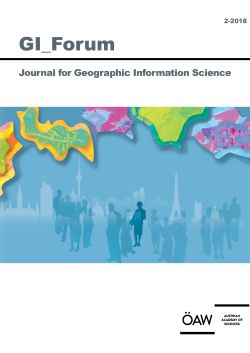Adrijana Car – Thomas Jekel – Josef Strobl – Gerald Griesebner (Eds.)
GI_Forum 2018, Volume 6, Issue 2
Journal for Geographic Information Science
Christian Dorsch
S. 168 - 180
doi:
10.1553/giscience2018_02_s168
Verlag der Österreichischen Akademie der Wissenschaften
doi:
10.1553/giscience2018_02_s168
Abstract:
Smart cities, despite their supposed benefits, also pose challenges to inhabitants. The promised improvements of quality of life, sustainability and efficiency are accompanied by a lack of data security and privacy, and a loss of spontaneous and chaotic but enjoyable urban life. School has to prepare pupils for life in the smart city, and therefore universities have to equip pre-service teachers for this task. This paper seeks to examine how portfolio work supports pre-service teachers in this undertaking. Portfolios compiled in a teacher-training seminar for geography and interviews with participants were analyzed and categorized. The results demonstrate that students created complex images of the smart city. The images widely agree with attributions assigned to smart cities by experts. Additionally, the study revealed abilities which the students developed through portfolio writing and identified tasks that supported them in this. For example, one student visualized his ideal city in an essay and thereby identified his own interests. The students described their learning process precisely and reflected on their opinion forming. The findings indicate that portfolio work is valuable in the learning field of smart cities in particular, as well as in the domain of the digitalization of society in general.
smart city, mediatization, geographical education, portfolio, emancipation
Published Online:
2018/12/10 12:10:16
Object Identifier:
0xc1aa5576 0x003a2016
Rights:https://creativecommons.org/licenses/by-nd/4.0/
GI_Forum publishes high quality original research across the transdisciplinary field of Geographic Information Science (GIScience). The journal provides a platform for dialogue among GI-Scientists and educators, technologists and critical thinkers in an ongoing effort to advance the field and ultimately contribute to the creation of an informed GISociety. Submissions concentrate on innovation in education, science, methodology and technologies in the spatial domain and their role towards a more just, ethical and sustainable science and society. GI_Forum implements the policy of open access publication after a double-blind peer review process through a highly international team of seasoned scientists for quality assurance. Special emphasis is put on actively supporting young scientists through formative reviews of their submissions. Only English language contributions are published.
Starting 2016, GI_Forum publishes two issues a Year.
Joumal Information is available at: GI-Forum
GI_Forum is listed on the Directory of Open Access Journals (DOAJ)




 Home
Home Print
Print
 References
References
 Share
Share
